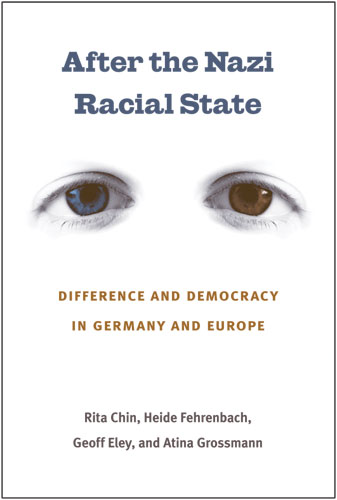After the Nazi Racial State: Difference and Democracy in Germany and EuropePosted in Books, Europe, History, Media Archive, Monographs, Social Science on 2013-08-12 15:25Z by Steven |
After the Nazi Racial State: Difference and Democracy in Germany and Europe
University of Michigan Press
2009
272 pages
6 x 9
Paperback ISBN: 978-0-472-03344-7
Ebook ISBN: 978-0-472-02578-7
Rita Chin, Associate Professor of History
University of Michigan
Heide Fehrenbach, Presidential Research Professor
Northern Illinois University
Geoff Eley, Karl Pohrt Distinguished University Professor of Contemporary History
University of Michigan
Atina Grossmann, Professor of History
Cooper Union, New York
An investigation of the concept of “race” in post-Nazi Germany
What happened to “race,” race thinking, and racial distinctions in Germany, and Europe more broadly, after the demise of the Nazi racial state? This book investigates the afterlife of “race” since 1945 and challenges the long-dominant assumption among historians that it disappeared from public discourse and policy-making with the defeat of the Third Reich and its genocidal European empire. Drawing on case studies of Afro-Germans, Jews, and Turks—arguably the three most important minority communities in postwar Germany—the authors detail continuities and change across the 1945 divide and offer the beginnings of a history of race and racialization after Hitler. A final chapter moves beyond the German context to consider the postwar engagement with “race” in France, Britain, Sweden, and the Netherlands, where waves of postwar, postcolonial, and labor migration troubled nativist notions of national and European identity.
After the Nazi Racial State poses interpretative questions for the historical understanding of postwar societies and democratic transformation, both in Germany and throughout Europe. It elucidates key analytical categories, historicizes current discourse, and demonstrates how contemporary debates about immigration and integration—and about just how much “difference” a democracy can accommodate—are implicated in a longer history of “race.” This book explores why the concept of “race” became taboo as a tool for understanding German society after 1945. Most crucially, it suggests the social and epistemic consequences of this determined retreat from “race” for Germany and Europe as a whole.
Contents
- Preface
- Introduction: What’s Race Got to Do With It? Postwar German History in Context / Rita Chin and Heide Fehrenhach
- CHAPTER 1: Black Occupation Children and the Devolution of the Nazi Racial State / Heide Fehrenhach
- CHAPTER 2: From Victims to “Homeless Foreigners”: Jewish Survivors in Postwar Germany / Atina Grossmann
- CHAPTER 3: Guest Worker Migration and the Unexpected Return of Race / Rita Chin
- CHAPTER 4: German Democracy and the Question of Difference, 1945 1995 / Rita Chin and Heide Fehrenhach
- CHAPTER 5: The Trouble with “Race”: Migrancy, Cultural Difference, and the Remaking of Europe / Geoff Eley
- Notes
- Select Bibliography
- Index
